Key takeaways
- Socratic Seminars enhance critical thinking by fostering open dialogue and encouraging diverse perspectives among students.
- Creating a safe, respectful environment allows learners to confidently express complex thoughts and challenge their own biases.
- Activist teachers model curiosity and collaboration, inspiring students to engage deeply with difficult questions and issues.
- Effective seminars are built on provocative, open-ended questions and guidelines that promote respectful listening and trust.
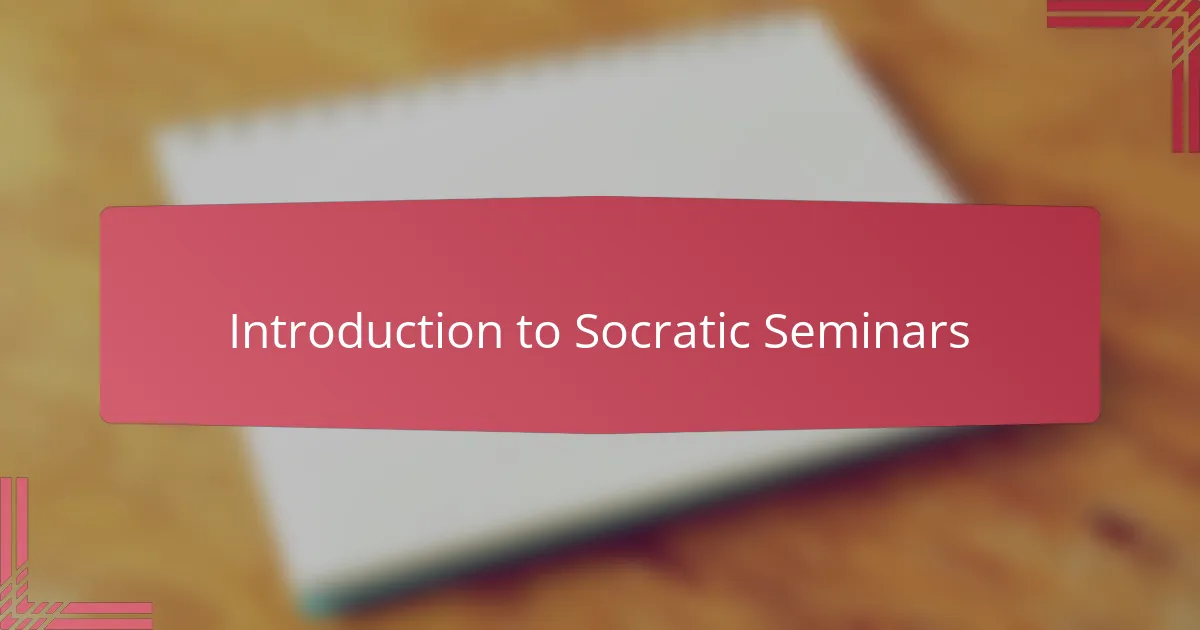
Introduction to Socratic Seminars
Socratic Seminars are a powerful way to spark deep thinking through guided dialogue rather than straightforward lecturing. When I first introduced this method in my classroom, I noticed a shift—students moved from passively absorbing information to actively engaging with ideas. Isn’t it fascinating how a simple conversation can unlock so much critical thinking?
What I love about Socratic Seminars is how they center on open-ended questions, encouraging students to explore multiple perspectives instead of just debating to win. I’ve seen students grow more confident as they listen carefully and thoughtfully respond, creating a genuine learning community. Have you ever felt that moment when a student’s insight completely changes the direction of a discussion? That’s the magic of this approach.
At its core, a Socratic Seminar is less about finding the “right” answer and more about nurturing curiosity and respect for different viewpoints. This made me realize how vital it is to create a safe space where every voice matters. When that happens, learning becomes a shared journey rather than a one-way street, and isn’t that what education should be all about?
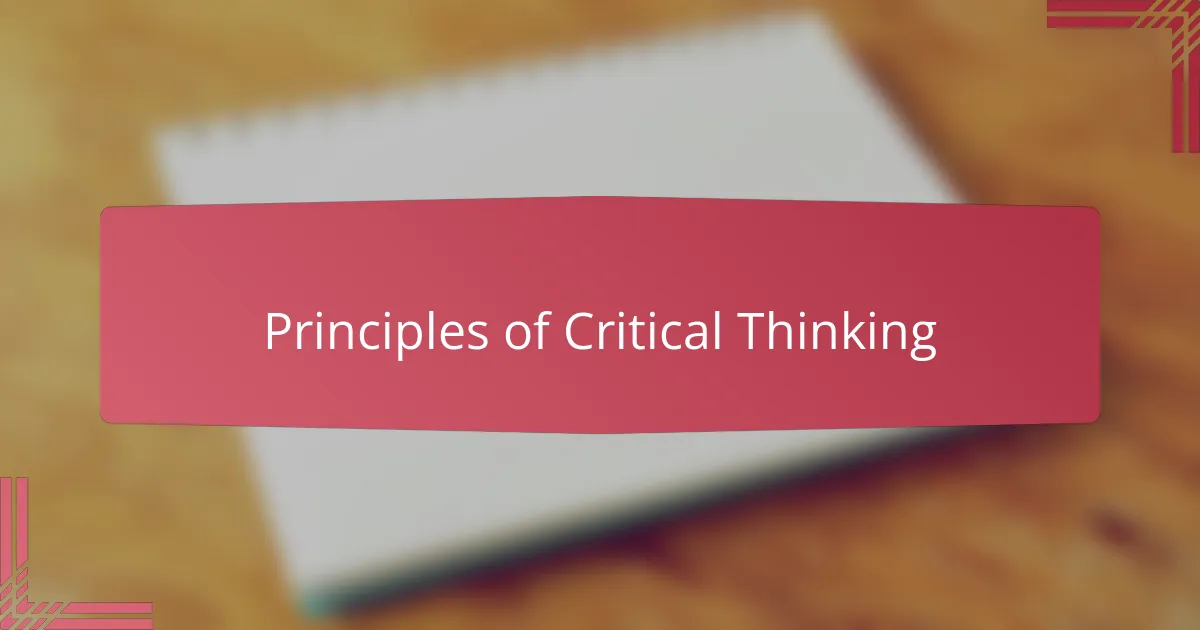
Principles of Critical Thinking
Critical thinking, to me, begins with curiosity—questioning what we hear, read, or see rather than accepting it at face value. I’ve noticed that when students learn to pause and consider the reasons behind their beliefs, their understanding deepens dramatically. Have you ever caught yourself wondering why you hold a particular opinion and then discovered layers you hadn’t thought about before?
Another principle I find essential is recognizing assumptions, both in ourselves and others. During a seminar, I’ve seen students hesitate initially, then bravely challenge their own biases when gently guided. That moment of realization can feel like a breakthrough, as if a new lens has been placed over their worldview.
Lastly, I believe evaluating evidence objectively is crucial. It’s not enough to have an idea; we need to back it up thoughtfully and listen to counterpoints with an open mind. I remember a discussion where a student’s careful analysis shifted the entire group’s thinking, showing me how valuing reason above opinion can transform conversations into meaningful learning experiences.
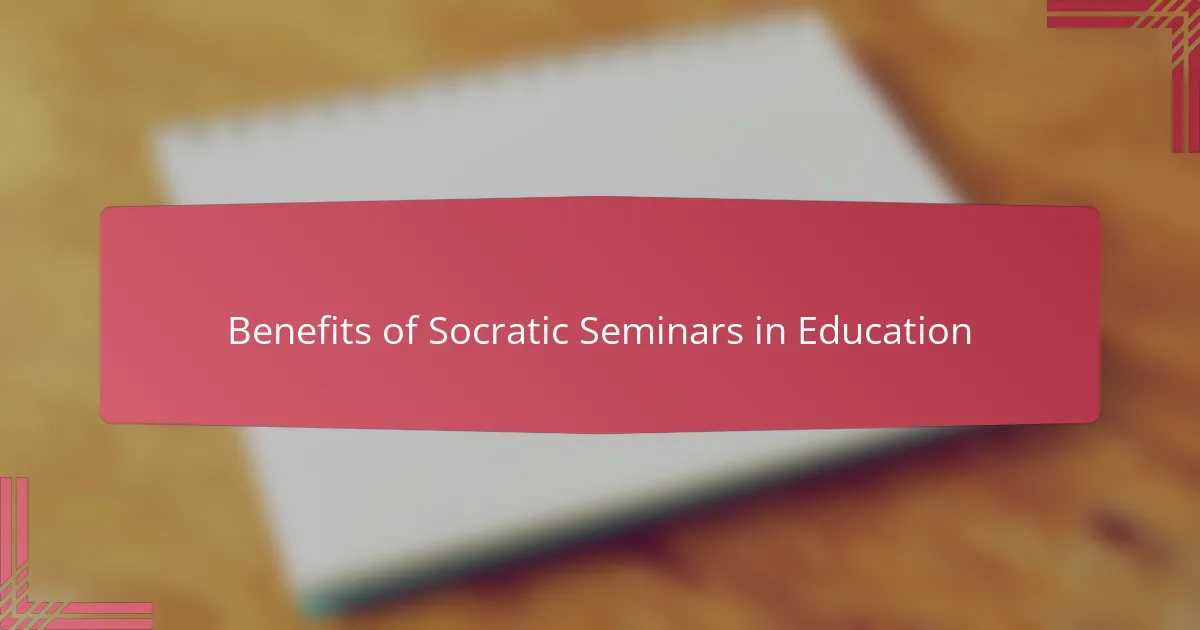
Benefits of Socratic Seminars in Education
What really strikes me about Socratic Seminars is how they foster active listening. Instead of waiting for their turn to speak, students genuinely tune in to their peers’ ideas, which deepens the conversation. Have you ever witnessed a classroom where everyone’s attention is so focused that even the quietest voice sparks a new line of thinking? That’s the kind of engagement these seminars cultivate.
I’ve also noticed that Socratic Seminars build students’ confidence in expressing complex thoughts. Because the environment is respectful and exploratory, learners feel safe to take intellectual risks—sometimes stumbling, often surprising themselves with insights they didn’t know they had. Isn’t it amazing how a supportive dialogue can empower someone to share ideas they might have kept bottled up?
Finally, the collaborative nature of these seminars mirrors real-world problem-solving. Students learn to appreciate diverse perspectives and develop empathy, which goes beyond academic benefits. When a student pauses and says, “I hadn’t thought about it that way,” it reminds me that education isn’t just about facts—it’s about human connection and growth. Don’t we want our classrooms to be exactly that kind of place?
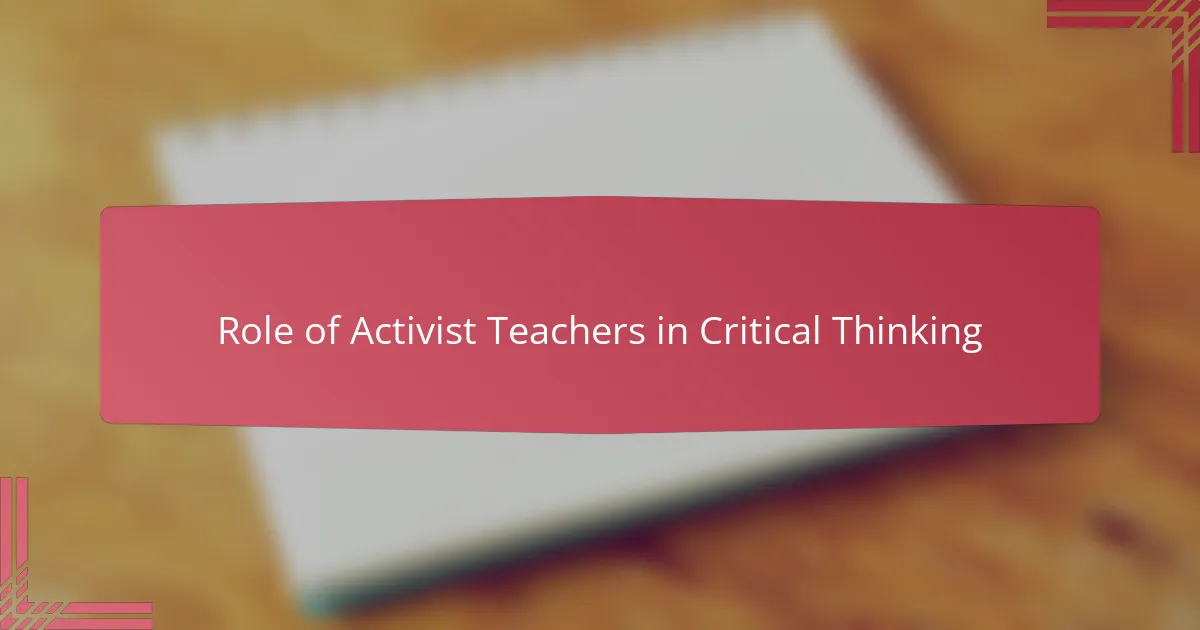
Role of Activist Teachers in Critical Thinking
For me, being an activist teacher means more than delivering content—it’s about challenging students to question the status quo and think deeply about the issues that shape their world. I’ve found that when I model this curiosity and courage in the classroom, students feel inspired to do the same. Have you noticed how a teacher’s passion can ignite a student’s desire to explore tough questions rather than shy away from them?
I recall a moment when a student hesitated to speak up about a controversial topic, fearing judgment. By fostering an environment where difficult conversations were encouraged and respected, that student eventually shared a perspective that shifted the entire group’s understanding. It was clear to me then how crucial it is for activist teachers to cultivate trust as a foundation for critical thinking to flourish.
Activist teachers must also embrace a continuous learning mindset themselves. When I admit my own uncertainties and invite students to join me in uncovering the complexities of an issue, it creates a powerful dynamic of collaborative inquiry. Doesn’t that kind of honesty make the learning process feel more real and accessible? For me, it’s one of the most effective ways to nurture authentic critical thinkers.
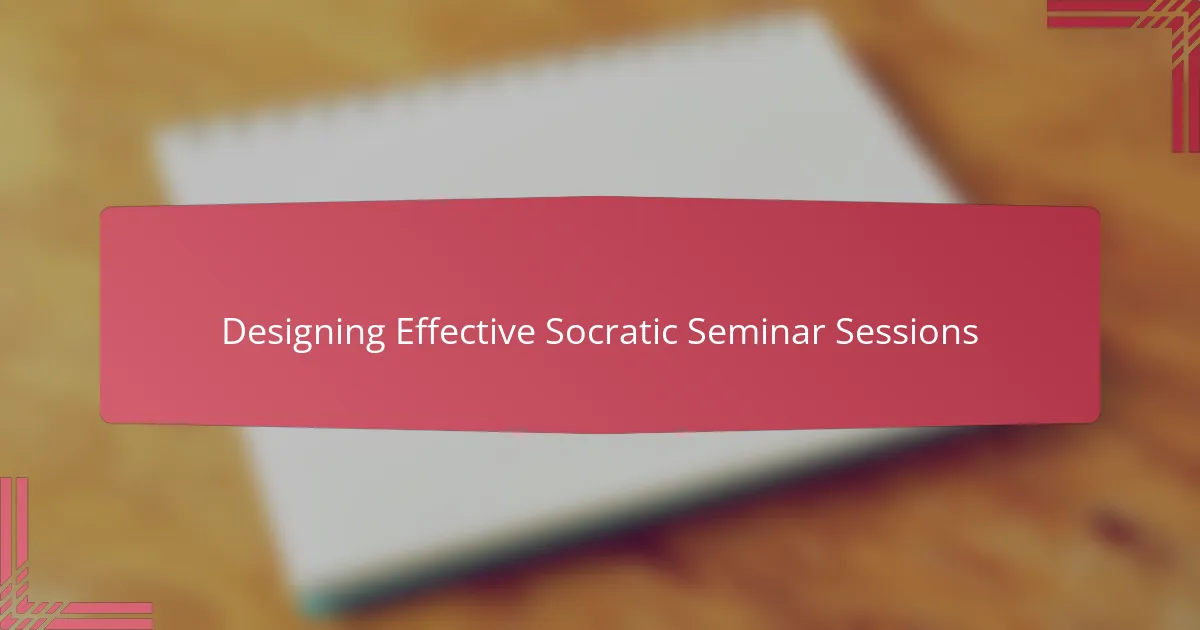
Designing Effective Socratic Seminar Sessions
Designing effective Socratic Seminar sessions starts with crafting questions that don’t just have one clear answer but invite curiosity and exploration. I’ve learned that when I pose open-ended, provocative questions, students naturally dive deeper, peeling back layers of thought instead of skimming the surface. Have you noticed how some questions linger in your mind long after the discussion ends? That’s the kind I aim for.
I also make sure to establish clear guidelines that encourage respect and attentive listening right from the start. When everyone understands that their role is to build on each other’s ideas rather than compete, the conversation flows more freely, and the classroom becomes a space of trust. I remember a session where simply reminding students to “listen to understand, not just to respond” transformed a tense debate into a rich, collaborative dialogue.
Finally, balancing preparation and spontaneity feels essential to me. Providing students with texts or materials beforehand equips them with context, but I leave room for unexpected insights during the seminar itself. One time, a student’s off-the-cuff analogy opened up a whole new way of looking at an issue—moments like that remind me why flexibility in design is so important. Isn’t it exciting when learning takes these unexpected, meaningful turns?
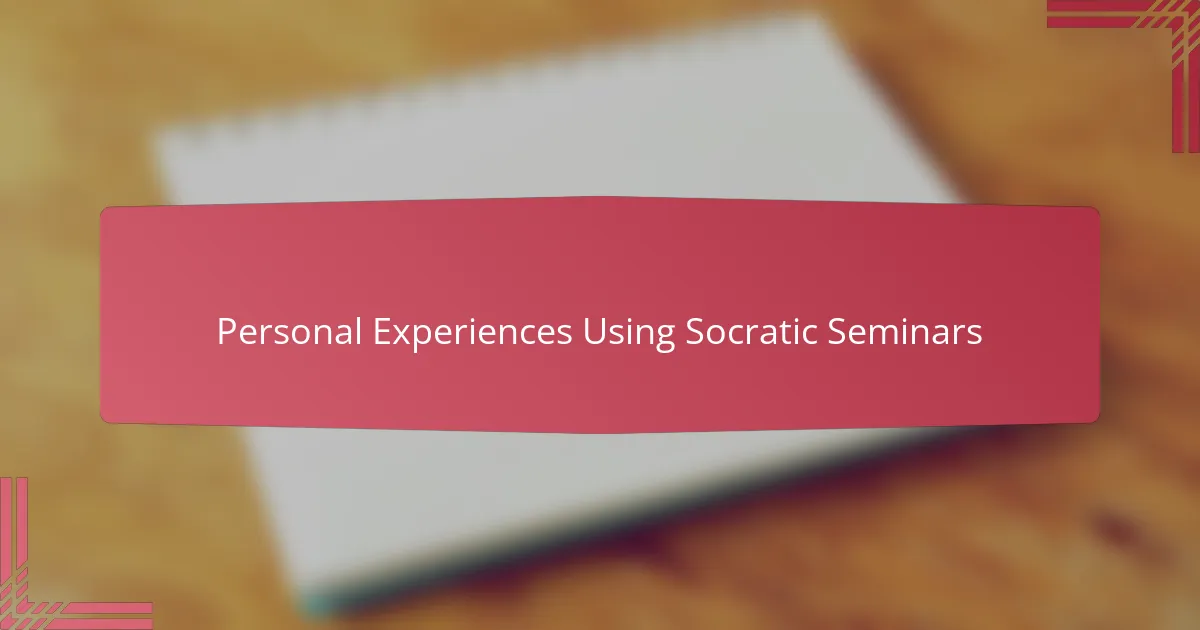
Personal Experiences Using Socratic Seminars
When I first tried a Socratic Seminar, I was amazed at how quickly students transitioned from hesitation to enthusiastic participation. I remember one shy student who rarely spoke up suddenly offering a profound interpretation that shifted the entire discussion. Have you ever witnessed a quiet voice change the energy of a room? That moment convinced me these seminars tap into something powerful.
Sometimes, the most rewarding part is witnessing students wrestle openly with uncertainty. I’ve seen tough questions spark silence at first, then lead to thoughtful exchanges where no one is in a hurry to “win,” but rather to understand. It’s those pauses, those moments of collective pondering, that reveal the true depth of critical thinking.
One particularly memorable seminar involved a controversial text that initially polarized the group. Watching students actively listen and reconsider their assumptions—without fear of judgment—showed me how Socratic Seminars can create a brave space for growth. Doesn’t it feel incredible when learners teach each other through genuine dialogue?
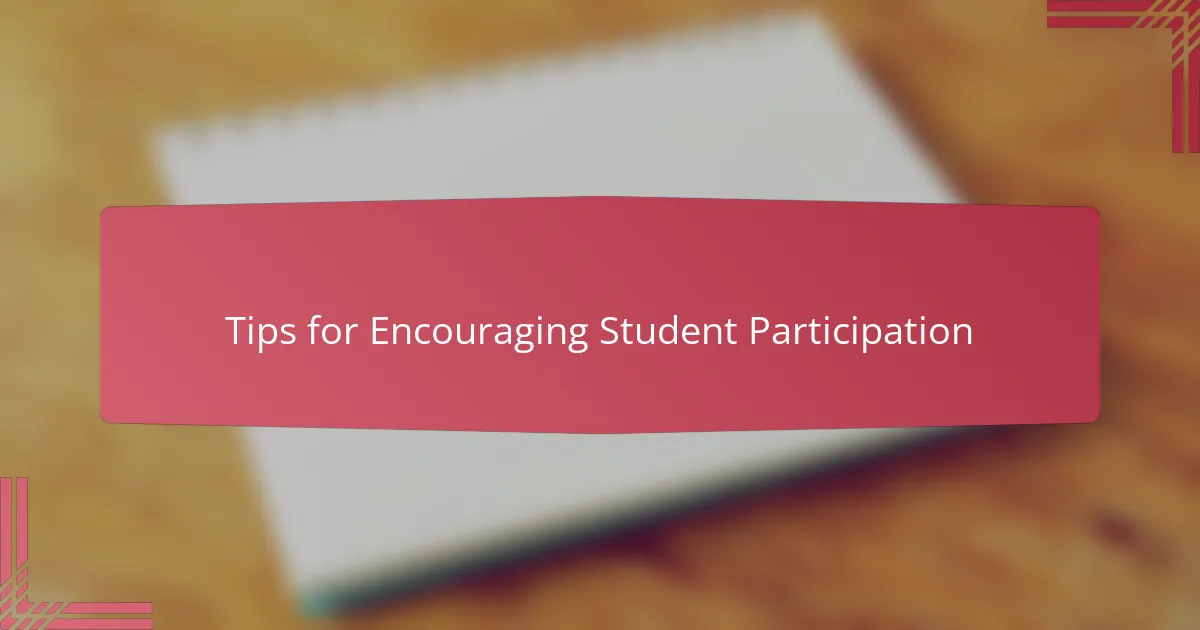
Tips for Encouraging Student Participation
Encouraging every student to participate can feel like a challenge, but I’ve found that starting with low-pressure prompts helps. When I give students simple, open-ended questions that invite personal reflection, even the quietest voices begin to share. Have you noticed how a student’s small comment can suddenly open the floodgates for others?
It also helps to remind students that there’s no “right” answer in a Socratic Seminar—just curiosity and exploration. I often say, “Your ideas matter because they make us think differently,” which seems to ease their fear of being judged. Isn’t it amazing how a little reassurance can transform hesitation into boldness?
Lastly, I make it a point to show genuine interest in each contribution, no matter how brief. Pausing, nodding, or echoing a student’s thought makes them feel heard and valued. Over time, this sense of belonging creates a classroom culture where participation feels natural, even exciting. Have you ever witnessed that moment when a student’s confidence suddenly soars? That’s when you know the environment is just right.